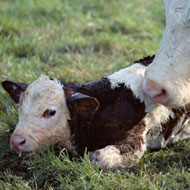One health study could shed light on fertility treatments

“This study highlights the validity of cattle as a model to study human ovarian physiology and fertility."
A new study of human cells and tissues collected from cattle has revealed the gene-regulating molecule miR-96 could be key to establishing and sustaining pregnancy.
When an egg is released from a follicle in the ovary, the tissue left behind forms the corpus luteum and secretes hormones that are essential for sustaining pregnancy. Inadequate production of progesterone has been associated with pregnancy loss in cattle, sheep and horses.
In humans this association remains unclear, but improving understanding in this area could lead to new fertility treatments.
Scientists from the Roslin Institute explored the effects of small non-coding RNA molecules (microRNAs) on the survival and production of progesterone by corpus luteum cells in humans undergoing assisted contraception.
Previous studies have implicated microRNAs in the maturation of ovarian follicles in several farm animal species. Roslin scientists also collected ovarian tissue from cattle to find out which microRNAs are up-regulated as the corpus luteum develops.
The team found distinct increases in the levels of miR-96 and miR-132 in luteum tissue, relative to follicular tissue. These changes were mirrored in human luteal cells.
Using a specific inhibitor to down-regulate miR-96 decreased the production of progesterone and triggered human luteal cell death. Further analysis revealed the effects of miR-96 are mediated by the transcription factor FOXO1, which offers insights into potential targets for new fertility treatments.
Lead author Dr Xavier Donadeu commented: “This study highlights the validity of cattle as a model to study human ovarian physiology and fertility. Our comparative approach provides new insight into reproductive mechanisms in humans.”



 The Animal and Plant Health Agency (APHA) has updated its online reporting service for dead wild birds.
The Animal and Plant Health Agency (APHA) has updated its online reporting service for dead wild birds.